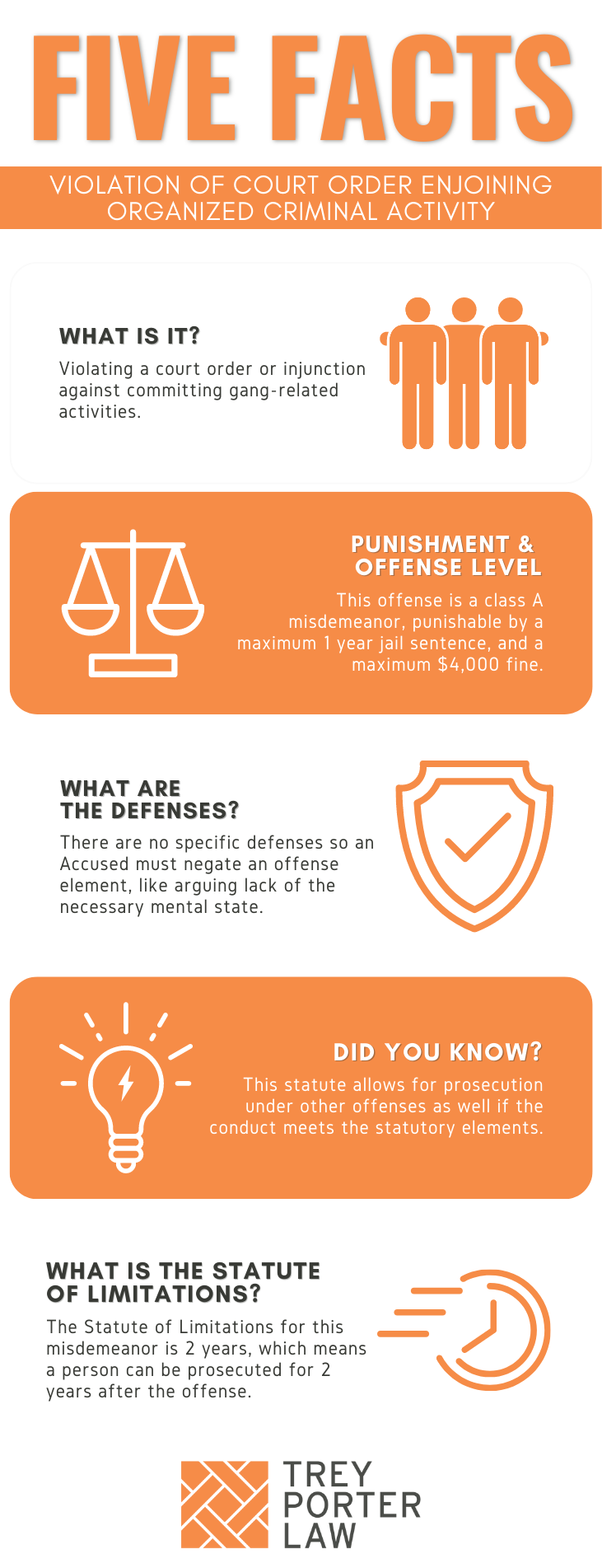WHAT IS VIOLATION OF COURT ORDER ENJOINING ORGANIZED CRIMINAL ACTIVITY IN TEXAS?
The Texas law against violation of court order enjoining organized criminal activity punishes knowingly violating a “gang injunction,” or a court order prohibiting organized criminal activity that has become a public nuisance.

- What are gang-free zones? Texas Penal Code Section 71.028 defines “gang-free zones” as any location: (1) in, on, or within 1,000 feet of a school, youth center, playground, residential treatment center; (2) on a school bus; or (3) in, on, or within 300 feet of a shopping mall, movie theater, public swimming pool, or arcade.
- What is a criminal street gang? Texas Penal Code Section 71.01 defines a criminal street gang as three or more persons having a common identifying sign or symbol or an identifiable leadership who continuously or regularly associate in the commission of criminal activities.
WHAT IS THE VIOLATION OF COURT ORDER ENJOINING ORGANIZED CRIMINAL ACTIVITY LAW IN TEXAS?
Tex. Penal Code § 71.021. VIOLATION OF COURT ORDER ENJOINING ORGANIZED CRIMINAL ACTIVITY.
(a) A person commits an offense if the person knowingly violates a temporary or permanent order issued under Section 125.065(a) or (b), Civil Practice and Remedies Code.
(b) If conduct constituting an offense under this section also constitutes an offense under another section of this code, the actor may be prosecuted under either section or under both sections.
(c) An offense under this section is a Class A misdemeanor.
WHAT IS THE PENALTY CLASS FOR VIOLATION OF COURT ORDER ENJOINING ORGANIZED CRIMINAL ACTIVITY IN TEXAS?
Violating a court order enjoining organized criminal activity is a Class A misdemeanor, punishable by up to one year in jail.
WHAT IS THE PUNISHMENT RANGE FOR VIOLATION OF COURT ORDER ENJOINING ORGANIZED CRIMINAL ACTIVITY IN TEXAS?
The punishment range for violating a court order enjoining organized criminal activity, a Class A misdemeanor, is up to one year in jail, and a maximum $4,000 fine.
WHAT ARE THE PENALTIES FOR VIOLATION OF COURT ORDER ENJOINING ORGANIZED CRIMINAL ACTIVITY IN TEXAS?
A person charged with violating a court order enjoining organized criminal activity may be eligible for probation after a conviction, or deferred adjudication without a conviction, for a period not to exceed two years.
Texas Code of Criminal Procedure article 42A.507 permits a court to order electronic monitoring or other form of GPS tracking as a condition of community supervision for a member of a criminal street gang who has been previously convicted of or placed on deferred adjudication for two or more felony offenses.
Texas Code of Criminal Procedure article 42A.508 further permits a court, as a condition of community supervision for a criminal street gang member, to restrict where and at what times a person on supervision may operate a motor vehicle.
WHAT ARE THE DEFENSES TO VIOLATION OF COURT ORDER ENJOINING ORGANIZED CRIMINAL ACTIVITY IN TEXAS?
The statute does not authorize specific defenses to violation of court order enjoining organized criminal activity. A person accused thereof may attempt to negate at least one of the elements the State must prove at trial.
- Is the Texas gang injunction law constitutional? When faced with arguments that the gang injunction statute violates the First Amendment and separation-of-powers doctrine, Texas courts have upheld the constitutionality of the law. The Legislature acted within its authority in delegating civil and criminal sanction for nuisance activities of criminal street gangs.For example, in Martinez v. State, a court order prohibited the defendant from associating with other known members of his gang, making gang hand signs, and wearing gang clothing. He was convicted of violating the gang injunction, and argued on appeal the court order violated the First Amendment and separation-of-powers doctrine.The Texas Court of Criminal Appeals affirmed his convictions, upholding the statute as constitutional. The law punishes certain speech and expression, but is narrowly tailored to achieve a compelling government interest.
WHAT IS THE STATUTE OF LIMITATIONS FOR VIOLATION OF COURT ORDER ENJOINING ORGANIZED CRIMINAL ACTIVITY IN TEXAS?
The limitation period for violation of a court order enjoining organized criminal activity is two years.
VIOLATION OF COURT ORDER ENJOINING ORGANIZED CRIMINAL ACTIVITY IN TEXAS
Texas law punishes violating a court order enjoining organized criminal activity in an effort to deter criminal gang-related violence. The Texas Civil Practice and Remedies Code permits a judge to impose reasonable requirements to prohibit criminal street gang activity, and the gang injunction law punishes violating those court-ordered requirements as a misdemeanor.
TEXAS VIOLATION OF COURT ORDER ENJOINING ORGANIZED CRIMINAL ACTIVITY COURT CASES
The case law regarding violation of court order enjoining organized criminal activity in Texas illustrates the statute’s application.
- In Merito v. State, the defendant was convicted of violating an injunction prohibiting him, as a member of the criminal street gang “Puro Lil’ Mafia,” from driving through a gang activity safe-zone. Gang Task Force officers in Witchita Falls saw the defendant wearing gang colors, and drive through one of the zones delineated in the injunction. The appellate court affirmed, holding the defendant was bound by the injunction, and failed to follow its requirements.
















